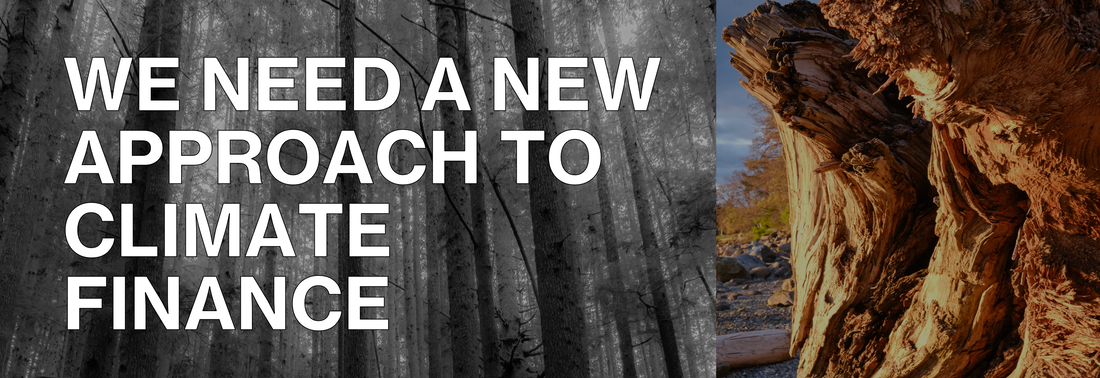|
About a year ago I returned to the world of climate finance and was shocked to find two glaring inconsistencies. There was a significant amount of capital going into the market (with more to come) and, more critically, that the old approaches to financing critical climate projects hadn’t changed in decades. These two trends are incompatible, and without a new approach to climate finance, I worry we will not be able to realize the potential, and the necessity, of funding our climate transition. Especially concerning is the lack of institutional investment in the market, the lack of which creates significant volatility in carbon prices, reduced trust in climate solutions, and significant risk throughout the value chain.
This is the start of a multi-part narrative on how our approach to finance needs to change. In it, we will explore a range of issues, such as the lack of trust in the carbon market, the market’s approach to risk, the quantity-vs-quality problem in funding carbon offsets, new asset management approaches, the industry’s myopic focus on co-benefits, why thematic approaches to climate finance create more problems than they solve, why we may not want to be so enthusiastic to regulation and standards in carbon, integrated approaches to financing the offset market, the role of technology and AI, why net-zero isn’t the panacea we think it is, and ultimately how we can make changes today to bring more institutional investment to climate finance. The goal of these narratives is to start a global conversation on these issues and explore new ways to approach climate finance, ultimately bringing more institutional capital to bear on our most pressing global climate problems. Creating a “village” around this issue is essential - it’s one of the reasons I joined with a small group of investors to create Canoe Carbon, a firm that promotes large-scale investment in the carbon offset market by introducing innovative financing models that help isolate investors from the regulatory and project risks inherent in traditional carbon offset investment - using technology, artificial intelligence, and research as a foundation. I hope to explore these areas with you over the coming months and will be engaging with colleagues from around the market though various mediums to explore solutions to these problems. I’m genuinely excited to be focused on climate finance again – matched only by my concern and, at times, panic that we are not moving quickly enough to solve the climate crisis that is already at our doorstep. I hope you will join me in this dialogue, and I welcome your engagement. I continue to believe that investors, in all forms, are the fulcrum upon which we will succeed or fail to meet the climate challenge. There are significant opportunities for investors out there, and there has never been a better time to finance climate projects – the key is finding the right ones and avoiding the bulk of the projects out there that carry unnecessary risk. Through this dialogue we’ll explore how we got here, what’s missing from the market, and explore some ideas on what to do next. Next, we’ll explore how the lack of trust in the carbon offset market came about, and its impact on the industry at large. Look for that in my next instalment of this blog, and I’m looking forward to embarking on this journey with you.
0 Comments
Building Back Better been a theme in the sustainable finance field for some time in various forms, but in the age of COVID-19 it has taken on a whole new energy. So today on the Green 4th Podcast we are opening a dialogue on BBB, especially before the idea gets subsumed by other, more powerful trending issues in our collective experience. Now that a prominent US presidential campaign is using it as a slogan, it may be inevitable that the hyper-partisan politicization of this concept will start to distort the meaning of what this movement means to us – both inside the sustainable investment community and beyond. Today's talk is about how we can build impact into our personal and professional lives as we approach a new normal, and perhaps leverage a few approaches I’ve found useful in the sustainable investment world.
Welcome! This is the blog companion to my podcast and upcoming publications on the Green 4th.
In the entertainment industry, there is a concept called the “fourth wall” – an imaginary wall that exists between the actors and the audience, where the audience can see through the wall but the actors cannot. From time to time, that wall is broken through so the actor can speak directly with the audience, usually to help them get a better understanding of what’s going on. Think of a movie where the actor breaks with the story to speak to the camera, or a stage actor addressing the audience directly. Breaking the fourth wall has become more popular over time and helps the audience engage and understand what’s going on. This got me thinking about how we have a similar concept in the sustainability world. We also have an imaginary wall – this time between the worlds of sustainability and business/investment that should not exist. This wall represents a barrier that has been created over decades by those within the sustainability industry that makes it more difficult – not easier - for businesspeople and investors to engage on sustainability issues. While life-changing sustainability issues like climate change and biodiversity loss continue to mount, people look on, expecting those behind the wall to deal with the issues, and sustainability experts continue to work diligently as if the public isn’t involved. It’s time that this “fourth wall of sustainability” is broken through to engage the unengaged on the critical sustainability issues that affect – and will affect - us all. The Green 4th will examine how the industry created (often with the best of intentions) a “black box” specialist discipline that can only be addressed by sustainability specialists and ensuring that fewer people can engage on the critical issues that affect us all. This book will outline how this wall came to be, why it persists, and how we can erase it – taking back control of sustainability issues so we can all do take action. |
Subscribe! |



 RSS Feed
RSS Feed